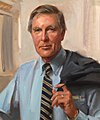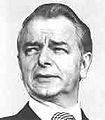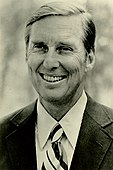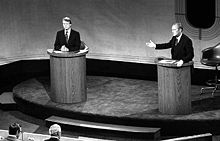Presidential election in the United States in 1976
| ‹ 1972 • |
|||||||||||
| 48th presidential election | |||||||||||
| 2nd November 1976 | |||||||||||
|
|
|||||||||||
| Democratic Party | |||||||||||
| Jimmy Carter / Walter Mondale | |||||||||||
| electors | 297 | ||||||||||
| be right | 40,831,881 | ||||||||||
|
|
50.1% | ||||||||||
| Republican Party | |||||||||||
| Gerald Ford / Bob Dole | |||||||||||
| electors | 240 | ||||||||||
| be right | 39.148.634 | ||||||||||
|
|
48.0% | ||||||||||
|
|
|||||||||||
| Election results by state | |||||||||||

|
|||||||||||
|
23 states + DC
Carter / Mondale |
27 states
Ford / Dole |
||||||||||
|
|
|||||||||||
| President of the United States | |||||||||||
The 48th election of the President of the United States of America took place on November 2nd, 1976 . The Democrat Jimmy Carter was elected , who could beat the incumbent President Gerald Ford of the Republican Party in a very narrow election.
Candidates
republican
Republican candidates:
Former Governor Ronald Reagan of California
The Republican Party nominated Gerald Ford, who took office in August 1974 after Richard Nixon's resignation in the wake of the Watergate affair .
Ford had been hard-pressed in the primary campaign by Ronald Reagan , the ex- governor of California . Reagan criticized Ford - whose incumbency as not popularly elected president less than was usual - mainly because of its allegedly inadequate support of South Vietnam in the final stages of the Vietnam War and its supposed to be flexible attitude towards the Soviet Union in the wake of already initiated by Nixon détente . Domestically, he took significantly more conservative positions than the moderate Ford. Although the president managed to win the first primary elections, with Reagan's clear victories in the south, especially in the Texas primary , the trend was reversed. At the end of the pre-election season, Ford's lead was too small to guarantee a victory at the party congress in the first ballot, where the delegates still had to vote according to the pre-election results. Reagan therefore tried to win votes from the Ford camp by nominating moderate Senator Richard Schweiker from Pennsylvania as his vice-presidential candidate. However, the maneuver failed and also cost him the support of a few conservative delegates, which is why he narrowly lost the vote in the first round. However, with a successful speech at the party congress, which in the opinion of several delegates exceeded that of Ford, he kept all options open for the future.
The Republicans elected Senator Bob Dole to serve as Vice President . The previous Vice President Nelson Rockefeller - appointed by Ford - declined to run for office. The liberal Rockefeller was seen in advance as too great a burden for Ford, which first had to assert itself against the conservative Reagan.
Democrats
Democratic candidates:
Former Governor Jimmy Carter of Georgia
Governor George Wallace of Alabama
Senator Frank Church from Idaho
Senator Robert Byrd from West Virginia
Former Ambassador Sargent Shriver from Maryland
Former Senator Fred R. Harris of Oklahoma
Senator Birch Bayh from Indiana
Senator Lloyd Bentsen from Texas
Former governor Terry Sanford of North Carolina
Delegate Walter E. Fauntroy from Washington, DC
With the Democrats, the relatively unknown Jimmy Carter, former governor of Georgia , surprisingly prevailed in the primaries. Senator Walter Mondale from Minnesota became the candidate for vice president. The peanut farmer Carter, whose mother had responded to his announcement of a presidential candidacy with the question "President of what?" never lie to you! ”win over many voters who were still under the impression of the Watergate scandal . His surprising victory in the first primary in New Hampshire , with which he proved that he could also win elections as a southern politician in the north, gave him great media coverage and made him known nationwide. After he succeeded with a series of primary victories, both the Governor of Alabama , George Wallace , his greatest competitor in the south, as well as Senator Henry M. Jackson from Washington and the Representative Mo Udall from Arizona to surrender was soon his lead with the party congress delegates was so great that neither some late primary victories of the Californian governor Jerry Brown nor an intra-party “Anybody but Carter (ABC)” movement (in German: “Anybody else than Carter” ), which u. a. unsuccessfully tried to persuade former Vice President Hubert H. Humphrey to run for a candidacy that could seriously jeopardize his nomination as a presidential candidate.
Election campaign
The main topic of the election campaign was the Watergate affair. Gerald Ford, who was not involved, was seen by many voters as too close to the disgraced Nixon government . Many also believe that Ford lost the election because he pardoned Nixon shortly after he was promoted to president , making prosecution impossible. Ford justified the pardon by not wanting to divide the country any further.
Carter, on the other hand, was able to portray himself as an honest reformer and led the polls throughout the campaign. However, Ford kept catching up before his testimony in the second televised debate that there was no Soviet dominance in Eastern Europe cost him victory. An interview by Carter with the men's magazine Playboy , in which he confessed that he had often committed adultery "in his mind", caused quite a stir .
Result
Carter won the election on November 2, 1976 with a two percent lead. What was remarkable about this election was that Carter received a majority in only 23 states and the capital Washington, DC , while Ford received more votes in a total of 27 states. However, since the states that Carter won were usually more populous and thus provided more electors, he was able to win 297 votes in the Electoral College , while Ford could only win 240 electors. In the popular vote , the percentage of votes in the people, Carter's lead was even narrower. He was able to unite 50 percent of the vote, Ford received a good 48 percent. The election result was much closer than the polls long predicted. Ford had only been able to catch up significantly in the opinion polls in the last few weeks of the election campaign, even if in the end it was no longer enough for a victory.
The extreme east-west divide in the won states was also exceptional. Gerald Ford had won every state in the western United States, while Carter was ahead in the vast majority of states in the east. However, in both the eastern and western parts of the country there were states where the result was very close. The Midwest was divided. Carter also won a majority in most of the southern states , although this once democratically dominated region has increasingly become a Republican stronghold since the 1960s, when Democratic Presidents Kennedy and Johnson promoted African American equality . However, Carter's success in the south was only a short-term comeback of the so-called Solid South , after which only Republican presidential candidates won in many of these states.
If Gerald Ford had won, he would not have been able to run again in the 1980 election , as he held the presidency for more than half the time in the previous term.
| candidate | Political party | be right | electors | |
|---|---|---|---|---|
| number | percent | |||
| Jimmy Carter | democrat | 40,831,881 | 50.1% | 297 |
| Gerald Ford | republican | 39.148.634 | 48.0% | 240 |
| Eugene McCarthy | independent | 740.460 | 0.9% | - |
| Roger MacBride | Libertarian party | 172,557 | 0.2% | - |
| Lester Maddox | American Independent Party | 170.274 | 0.2% | - |
| Thomas J. Anderson | American party | 158.271 | 0.2% | - |
| Peter Camejo | Socialist Workers Party | 90,986 | 0.1% | - |
| Gus Hall | Communist Party | 58,709 | 0.1% | - |
| Margaret Wright | People's party | 49.013 | 0.1% | - |
| Lyndon LaRouche | US Labor Party | 40,043 | 0.0% | - |
| Ronald Reagan | republican | 0 | 0.0% | 1 |
| Other | 70,785 | 0.1% | - | |
| total | 81,531,584 | 100% | 538 | |
270 votes were necessary for the election to the president. Ronald Reagan, who did not run for election and received no popular vote, received an electoral vote from Washington. The renegade Republican elector Mike Padden , a so-called unfaithful elector, wanted to protest against the abortion policy.
literature
- William T. Horner, M. Heather Carver: Saturday Night Live and the 1976 Presidential Election: A New Voice Enters Campaign Politics. McFarland, Jefferson 2018, ISBN 978-1-4766-7184-0 .
- Donald Richard Deskins, Hanes Walton, Sherman C. Puckett: Presidential Elections, 1789-2008: County, State, and National Mapping of Election Data. University of Michigan, Ann Arbor 2010, ISBN 978-0-472-11697-3 , pp. 459-468 (= Chapter 50: James Earl Carter's Election. ).
Web links
Individual evidence
- ↑ I pray to God that I am doing the right thing , Der Spiegel No. 20/1976 of May 17, 1976
- ↑ Playboy: Jimmy Carter The Playboy Interview - Excerpt ( Memento from September 23, 2013 in the Internet Archive )
- ↑ Craig Morris: The votes that really count have not yet been cast . In: Telepolis . December 11, 2004



















